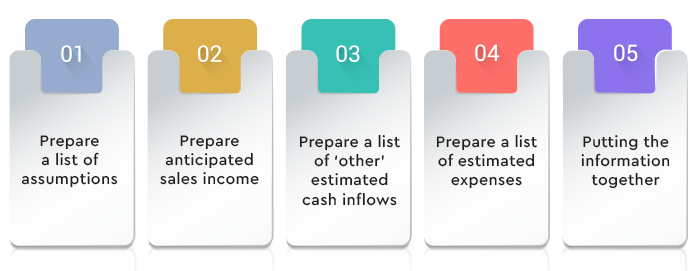
1000+
customers

50+ countries
across the world

Outsourcing leader
since 2008

Technology-driven
services

Stringent
quality processes
How to Cope up with Business Finances Effectively
Last updated: 29 Jan, 2024 By Ashish Rana | 6 Minutes Read

With the first quarter of the financial year 2021-22 already passed, small business owners are looking forward to financial upliftment. However, only those who are well-prepared will reap the benefits. Therefore, if you wish to bloom your business for the rest of the year, you must build strategies to get your finances in order.
And luckily, organizing these things is not as complicated as it looks. Here, we will discuss everything you need to know and do in order to make your financial situation all set for success.
It can be tiresome and time-consuming for many business owners and entrepreneurs to stay updated with the finances, as running a company requires handling multiple roles.
As per a survey by Staples, nearly one-third of small business owners that are struggling believe that the leading cause of productivity loss is disorganization. In addition, productivity loss further leads to more disorganization. This cycle, ultimately leads to revenue loss and financial hardships. However, it can be overcome by building a strategic approach with respect to the situation.
Effective Methods to Catch Up With Your Business Finances
1. Build Cash Flow Forecast
The cash flow forecasts are revenue and expenses related data-backed projections. Analyze your previous cash flow statements to build valuable predictions for the future. You can follow the mentioned steps to create a cash flow forecast:
Also, make sure to keep in mind other economic factors that can impact cash flow in 2021. For instance, your business might have grown after the COVID-19 lockdown was lifted, but due to the second wave and geo-political tension, it’s still doubtful whether you will get more clients and customers in the remaining 2021.
Creating a forecast for your cash flow assists you in locating financial shortcomings and opportunities while there is still a chance. For example, if you expect an extensive upcoming sales volume, you will be prepared to stock your inventory. Or, if you have foreseen a sluggish quarter, you can secure a business line of credit to counter the slow-moving season.
2. Creation of Operating Budget
Visualize your budget as a plan for building an approach to achieve your desired business goal. The operating budget furnishes you with an opportunity to strategize your revenue goals and break them down into monthly objectives and evaluate the costs needed to meet those goals. Planning can be an effective method to ensure that you are organized and focused on your financial goals.
3. Utilize Financial Reports
The Income Statement, the Balance Sheet, and the Statement of Cash Flow are your top financial reports. These reports reveal the complete story of how your business is performing. The insights that you acquire through these reports are invaluable. For example, these reports provide information regarding the business’s profitability, profit margins for offers, significant expenses, wastage of resources, investments pay-off amount, etc. Therefore, it can be significantly beneficial for assuring sound business finances that you learn how to analyze these reports.
Moreover, partnering with reliable accounting outsourcing services can streamline the process of generating these reports, ensuring accuracy and efficiency in your financial analysis.
4. Maintain Healthy Business Credit
Business credit is defined as the capacity of a business to purchase any resource and pay for it afterward. One will surely come across business credit as a small-scale business owner. The reason is those small businesses are often in demand of loans to make investments in their business operations. Decent business credit or business rating can aid you in acquiring loans when your finances are in an unwell condition. It can also assist in enhancing the market reputation of your organization and the easy acquisition of resources.
Timely pay your dues and maintain a good credit history to increase your business credit. You can also sign up for a business credit card to assign a sum of cash for emergency usage. However, make sure to choose the right plan with lower interest rates. Also, keep in mind that defaulting on your loans can derail you from building a good credit score.
5. Uplift Your Return on Investment ( ROI)
Make sure you don’t miss to take any potential investment opportunities that can boost the growth of your small business. Try to understand the ongoing market situation well and make investments in ventures that can surge your ROI ( Return on Investment). In addition, if your business processes are consuming a lot of resources and upsetting your business finances without delivering sufficient ROI, then maybe you should re-strategize things.
Evaluating your expenditure and ROI can help business owners identify which investments are worthy of their hard-earned money. Risk identification and management can come in handy to recognize any potential risk within the company. Consider reading market forecasting reports to gain awareness about the ongoing market situations.
6. Track and Classify Expenses
Develop a consistent habit of reviewing your bank statements and classifying transactions. For example, is it an office supply, insurance, or rent? Maintaining your books uniformly by monitoring purchases and payments helps track cash flow actively and formulate effective financial management strategies for daily business operations.
Scan and create digital copies of the receipts to categorize each expense. This will help you avert any missing tax write-offs or overstating expenses in your tax filings. In addition, there are document management software apps that allow you to do things anywhere, anytime. You can also take assistance from a CPA accounting services provider if you want experts to look after your complete taxation process.
Also, a great way to ensure that your personal finances do not get entangled with your business expenses is to issue a business credit card. To make it even more convenient, many business credit cards classify expenses, simplifying the tracking of expenses.
Expense monitoring can have a bottom-line impact on business owners. Unable to account for legitimate costs can increase your tax liability. This can harm business finances and lead to profit reduction.
7. Implement Accounting Software
Software that utilizes cloud technology like Xero and QuickBooks can be of great assistance. They help keep books up to date, let you directly download transactions, and save a lot of time consumed in manual data entry into spreadsheets and revaluating each transaction. Such accounting software can significantly save time by automating many accounting functions such as daily tracking of transactions, managing invoices, etc. Many major banks utilize these software solutions, which allow you to link and download your account transactions. Furthermore, you can hire external accounting experts if you don’t know how to operate and think you need assistance with Xero bookkeeping.
These software products act as a safe and secure platform from where you can easily access financial data without the fuzz of going through piles of paperwork. These products offer packages that are designed especially for small business owners and provide numerous templates for everyday business operations like invoicing and budgeting. However, to ensure the effective working of the software, the information logged in should be up to date and accurate.
Accounting software may assist in tackling large amounts of transactions. Still, if your business does not have many transactions as of now, in that case, you can manually enter transactions in an Excel sheet but make sure to classify them so that there is no inconvenience or confusion during tax fillings.
8. Conduct Check-Ins
Make time to go through your finance management plans regularly during the year. It’s easy to get occupied by daily and weekly operations. Therefore, a pre-scheduled check-in can ensure that you keep a bird’s view and visualize the bigger picture.
Quarterly or monthly check-ins can make a huge impact. You can do it yourself, but a better option would be to get your accountant or bookkeeper to look at financials along with you.
The Bottom Line
With three quarters still in hand, you may feel that there is an ample amount of time to catch up with business finances. However, maintaining a consistent check on things will take away a lot of future workloads. Therefore, follow these tips to ensure your business finances stay in good shape.
Looking for a Place to Start?
It can be tedious and distressing to leave core operations and focus your attention on such a task. However, these tasks are also equally important. An excellent solution would be to hire external accounting experts who can take care of everything and allow you to stay focused on revenue-generating activities.
Cogneesol, a globally recognized accounting services firm, is a firm that offers a variety of accounting services for businesses and CPA firms worldwide. Learn more about our effective and customized accounting solutions; call us at +1 833-313-3143 or email at [email protected].
Latest Blogs

This site is protected by reCAPTCHA. Google's Privacy Policy
and Terms of Service apply.









